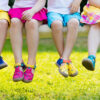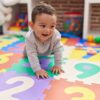Providing the right ingredients for healthy development from the start produces better outcomes than trying to fix problems later says the Center on the Developing Child at Harvard University.

The term “plasticity” is often used to describe the brain’s capacity to learn from experience. This capacity is greatest early in life and decreases with age. Harvard’s researchers found that, “although developmental windows remain open for many years, trying to change behaviour or build new skills on a foundation of brain circuits that weren’t wired properly from the beginning requires more effort – both for individuals and society.”
Their research reveals that one skill begets another as children’s brain develops from the bottom up. In essence, the development of gross and fine motor skills, coupled with basic cognitive skills, progressively pave the way for acquiring higher-level skills like the ability to focus and sustain attention, set goals, follow rules, solve problems, and control impulse.
Childhood play, and the toys that stimulate it, are an essential part of this journey. The right toys, introduced at the right time, can incrementally promote these fundamental skills. Here in Australia, toy distributors like Artiwood are passionate about making this progression as effortless and motivational as possible.
Artiwood has been sourcing and supplying eco-friendly educational toys for more than two decades. It distributes premium toy brands like Bigjigs, New Classic Toys, Indigo Jamm, and I’m Toy. In the last five years it has tripled in size and won multiple awards.
Artiwood’s Managing Director, Andrew McGregor, attributes much of its success to an unrelenting focus on toys with a multi-functional design. This ensures greater play value, incremental learning opportunities and a longer active lifespan. He highlights products like the Kinderfeets Pikler Triple Climber Triangle as a classic example of this philosophy in practice.


Built from sturdy German beechwood, it has three climbing surfaces: a rope net, foot pegs and rungs. Each surface offers an increasingly challenging play option; that is, it promotes one skill that begats the development of another – just as Harvard’s researchers have note.
Andrew says HEADU’s educational activity kits are another great example. These beautifully illustrated, academically developed kits include plenty of Montessori inspired learning activities, puzzles, and games sure to help develop young minds through curiosity at an early age.
Take the popular “Learn to Draw”. This kit includes 10 four-piece puzzles. The illustration on each puzzle teaches a child to draw an animal. An enclosed drawing board and erasable marker then lets them practice drawing each animal. One compact kit delivers more than 20 learning activities, while promoting increasingly advanced cognitive skills.
Andrew concludes his series of examples with the I’m Toy Melody Mix Wall Bench. This multi-functional toy packs ten sound and music activities into one robust wooden frame. It promotes gross motor skills with instruments like rattles and drums while others, like triangle and chimes, develop more advanced fine motor skills.
Learn how Artiwood’s multi-functional, educational toys can meet your early childhood development needs at www.artiwood.com.au










